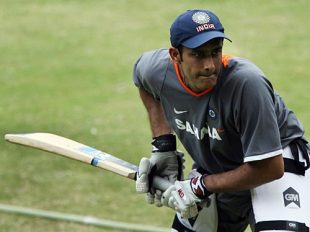
Ashwell Prince struck a determined 101, but South Africa were made to follow-on and closed day three of the first Test at Lord's 333 behind England on 13-0.
Prince battled for 68 overs, sharing 78 with AB de Villiers after three wickets had fallen in the first 90 minutes.
They held out for much of the second session, but Monty Panesar (4-74) was dominant as six wickets fell after tea.
Prince was ninth out, edging the new ball, before the South Africa openers held out against spin in fading light.
It was just reward for England, who matched the discipline shown by their batsmen with a channelled display of bowling and fielding.
Few are likely to tell their grandchildren about Prince's innings, but without it, he might well have been batting for a second time before the day was out. Graeme Smith was, having to bizarrely face Panesar and Kevin Pietersen with the new ball in questionable light in the follow-on having earlier fallen in the third over of the day.
James Anderson found some extra life on the line of off-stump, the skipper looped a simple catch to gully after the lifting ball caught the shoulder of his bat.
That variation in bounce may have unsettled the minds of the batsmen, but in truth there were no gremlins in the surface.
England bowled with focus and, with the exception of Prince, the South Africans surprisingly showed a lack of customary grit.
Hashim Amla, fresh from scores of 172 and 161 in the two warm-up matches, made a scratchy six from 32 balls before feathering a catch off Stuart Broad.
Still there was little assistance in the pitch for the bowlers, and yet half an hour before lunch it was 47-3 and Jacques Kallis, who has scored five of his 30 Test centuries against England, was the next man to go. Kallis had got off the mark in fortuitous fashion with a flat-footed thick edge through the slips from a ball he appeared not to see too well, and his feet failed to move much at all throughout his short innings.
Ryan Sidebottom found no real swing until the new ball was taken late in the day, and generally looked far from his probing best, but he angled one across Kallis and Andrew Strauss held an excellent low catch at first slip.
Neil McKenzie and Prince, the two most adhesive batsmen, took their side through to lunch, but in the second over after the interval England struck again.
Having bisected first and second slip with an edge, McKenzie, full of eccentric mannerisms, saw his methodical display of resistance ended by a stunning delivery from Panesar.
Flighting the ball beautifully, Panesar turned one from leg stump to bowl him round his legs as he pushed forward, a dismissal more often associated with the magical leg spin of Shane Warne.
The one partnership of note followed, De Villiers reining in his natural attacking instincts, to provide an admirable foil for the gritty Prince.
With the wicket flat it needed something special to break through, and it came from Anderson, who took off to his right at mid-on and snared a spectacular two-handed catch as De Villiers fatally tried to break the shackles driving at Panesar.
Mark Boucher, so often a stubborn thorn from the late middle order, got an inside edge onto his stumps from the first ball of Broad's new spell, while Morne Morkel was bowled by a classic from Panesar that turned out of the rough and crashed into the timbers.
By that stage Prince had decided to play some shots, no doubt aware he could not rely on his partners to get him to three figures, and after 138 balls without a boundary he reverse swept Panesar for four then mowed him over mid-wicket for the ony six of the day.
He soon lost Paul Harris, who followed his largely ineffective display with the ball with an unconvincing batting performance, miscuing his rather more accomplished spin counterpart Panesar to mid-on where Anderson took another good catch, low diving forward.
After an eighth Test century of application and fine shot selection, Prince drove in tired fashion as Sidebottom had more success with the new ball, and Pietersen's magical influence continued when he was brought on in murky light to take the final wicket when Dale Steyn swiped agriculturally to mid-off.
Pietersen could not dismiss his arch-rival Smith, despite a frenetic appeal for a bat and pad catch with the final ball of the day, but it is quite clear who will be the happier of the two at this stage of the match.









